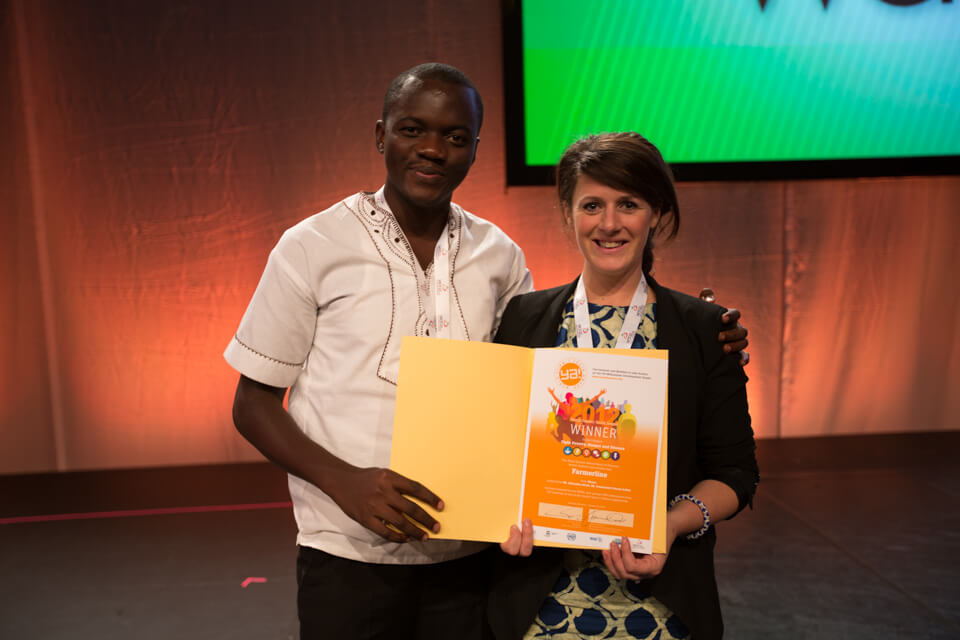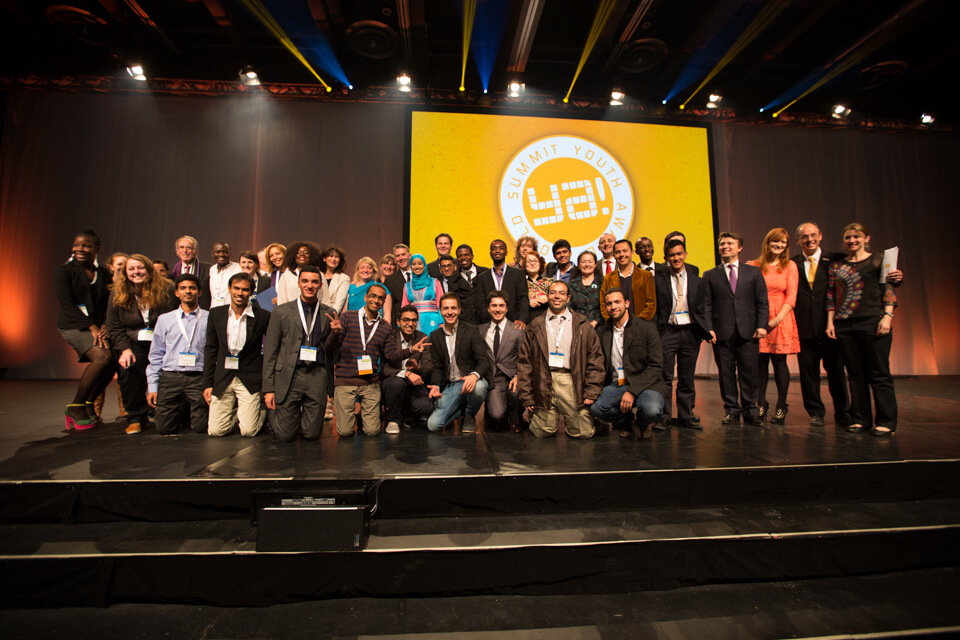Guest post by Alloysius Attah, alumni of Mobile Web Ghana Lab
Back in high school, what success in education and learning meant to my teachers and parents was that I score straight A(s) at every examination. I was trained to have a perfect score in my examinations and that was success to us. I remember those of mates that were not able to make good grades were labeled as not being serious and were often treated as kids without talent. My dream by then was to finish school and enter one of the best universities in the country – and land a good job after that. Failure was an abominable word in our society and it still is. Society has it that, failure is the worst thing that can happen in our lives – both personally and professionally. And since we are all products of our environment, we grew up believing that from a very young age consciously or unconsciously.
Fast forward to my final year in the university, I felt very lucky and privileged to have come this far and I wanted to give back and make much more social impact than just having good academic records and landing a high paying job after my university education. Mobile Web Ghana Entrepreneurship Program (a program developed as part of the World Wide Web Foundation’s Mobile Entrepreneurship in Ghana program) was one of the few programs supporting social entrepreneurship in the country. I enrolled into the program in September last year and I developed Farmerline (a mobile service committed to helping smallholder farmers to become entrepreneurial to produce more food to feed the future) with Emmanuel Owusu Addai, an MSc graduate in Geodesy from the Kwame Nkrumah University of Science and technology. After months of working on the project and winning the Apps4africa competition, we invited Rebecca Peel of Engineers Without Borders-Canada (EWB) who was then in Ghana working with the Ministry of food and Agriculture to join the team as an advisor. I became a social entrepreneur without even knowing the term “Social Entrepreneur” existed.
Personally, my desire to be perfect, to avoid failure at all cost, was one of the biggest limiting beliefs in my entire life. I was so terrified of the consequences of being less than perfect (which in my high school days were useful) that I spent more time thinking about how to avoid the fail than focusing on the lessons that all of life – including failure – could teach me. Working at Farmerline, one of my failure points was when I failed to admit my challenges and failures freely as a young leader in a startup and going into most pitching sessions being defensive about the my idea and shutting out constructive feedback as a result. I wanted my idea to be flawless instead of opening up to learning and growth. This reduced my momentum and growth as a social entrepreneur. There were times that I missed out on the opportunity of learning from my peers and experts because I was too busy focusing on beating them as if we are in some sort of imaginary competition.

My aha moment on failure was when I travelled to Canada on behalf of Farmerline to receive the World Summit Youth Award in Montreal. I spent two weeks working from the EWBs national office in Toronto after the award ceremony in Montreal. During this time, I had the opportunity to work under the same roof with some the world’s amazing social entrepreneurs. I really enjoyed the culture and energy there and I learnt so much. One of the most striking lessons was their attitude towards failure. EWB writes an annual failure report which highlights stories of failure and learning from their staff working in Canada and in Africa. It’s their way of instituting a practice which reflects the spirit of innovation they would like to see across international development sector. Reading the 2010 failure report enabled me to explore the instinctual and learned programming that limited me and my world that I’ve come to embrace, and celebrate the powerful lessons inherent within failure.
That’s why I now know the unlimited possibilities that are waiting for all social entrepreneurs when we shift our beliefs and responses to failure. I think the educational institutions and entrepreneurship programs in Ghana should treat failure as a means to better beginning instead of a means to an end. Organizations like the Web Foundation and Mobile Web Ghana and impact investors should also provide a “safety net” and financial resources to entrepreneurs to experiment with their ideas freely without necessarily expecting a financial return on their investment. This will help view failure in a different light in Ghana.

Stephen Haggard
December 20, 2012
Nice post alloysius, very well stated points and bang on the nail. Some say that California's asset is its acceptance of failure and admiration more of the guy who tried, got it wrong, and tried again, than of the guy who happens to be right at the moment.
Reply
Schandorf Adu Bright
December 21, 2012
This is unbelievably great post Alloysius, you have inspired me brother, success in my own is moving from failure to failure without losing your passion and enthusiasm. The thing that limits other is they turn their fallen place to be your sleeping ground.
Reply
Victor Asemota (@asemota)
December 21, 2012
Awesome! African tech blogs and event organizers have made entrepreneurship a schoolyard contest and we have been fighting hard to reverse this trend in the for profit sector. It is very refreshing to see that this is also being acknowledged in the social impact field where the bulk of our techies seem to flock to try to find instant gratification and acknowledgement.
Reply
Alloysius
December 23, 2012
Thanks Stephen. I look forward to working with you.
Reply
Alloysius
December 23, 2012
@Victor. I couldn't agree more.
Reply
Alloysius
December 23, 2012
@Schandorf, you are an inspiration too. The future is here.
Reply
Andy Molloy
January 3, 2013
Taking risks is the only way to find new ways and solutions to old problems. When things don't turn out as expected we find new opportunities. Accounting for delayed progress is the main challenge for those that experience unexpected outcomes but that is a failure in society not the enterprise! "Failure" is the most fertile compost from which prefers can be cultivated if we take care to germinate the seeds of ideas that we find in the process. @ecoesp
Reply
Andy Molloy
January 3, 2013
The typing error in my previous post was neither helpful or constructive! "Prefers" in the last sentence should read "progress". Oh that my failure to operate my technology accurately in a hurry were less public!
Reply
Peter Jentzsch
January 9, 2013
Hi Alloysius. Inspiring post. I have taken the liberty of elaborating on it in a post of my own:http://creativeconnexions.wordpress.com/2013/01/08/kvaj-dig-til-succes/Best,Peter
Reply
Franco Papeschi
January 17, 2013
Reading the post, it seems to me a good starting point for many a startup, and 'fear of failure is usually included in the typical indicators for assessing Entrepreneurship success (see for example 'Entrepreneurship at a glance 2012, a publication by OECD, which includes in its indicators "Fear of Failure would prevent Starting a Business" and "Risk for Business Failure" in the section on Entrepreneurship culture - http://tinyurl.com/bcrbuj5)But there is something simplistic in saying 'failure is good'. You can easily achieve failure by being totally unprepared and uncommitted and also by being superprepared and supercommitted (check a funny-because-it's-true post by Eric Reis on this (http://www.startuplessonslearned.com/2009/01/achieving-failure.html). It's the learning that come with failure what matters. In this sense, 'failure is good' is only true under 3 conditions (at least):1. one needs to really have a clear set of assumptions on the conditions that would make your product succeed (or at least gain enough traction). And validate / challenge them at any corner2. one needs to be ready to act upon any mismatch between assumption and reality3. there is a difference between responsibility and blame (I think I learnt this in one of my past lives, reading 'Normal Accidents' http://www.amazon.co.uk/gp/product/0691004129/)In this sense, Failure with the big F (the one where you go K.O. with your belly up) it's a different thing from failure at micro scale. And it's being able to spot these micro-failures that makes the difference (IMHO). Spotting these micro-failures it's an exercise in humbleness and flexibility of mind, but it needs exercise. How many things are we failing at every half-day? What are the conditions that make them happen? I'm pretty sure there is a micro-failure muscle that we need to train….
Reply
Franco Papeschi
January 17, 2013
Also, this post on Growthology (http://www.growthology.org/growthology/2012/12/learning-from-business-failure.html) highlights a research on the benefits of this experience for a serial entrepreneur’s next endeavour.
Reply
Ajibola
February 11, 2013
Hi Alloysius, really nice post highlighting the acceptance of failure in the African physce, or should i say lack of acceptance. From your pitch at GIST I must say you have come a long way from the guy who wouldnt take feedback. Failure or not, perseverance is the key.
Reply